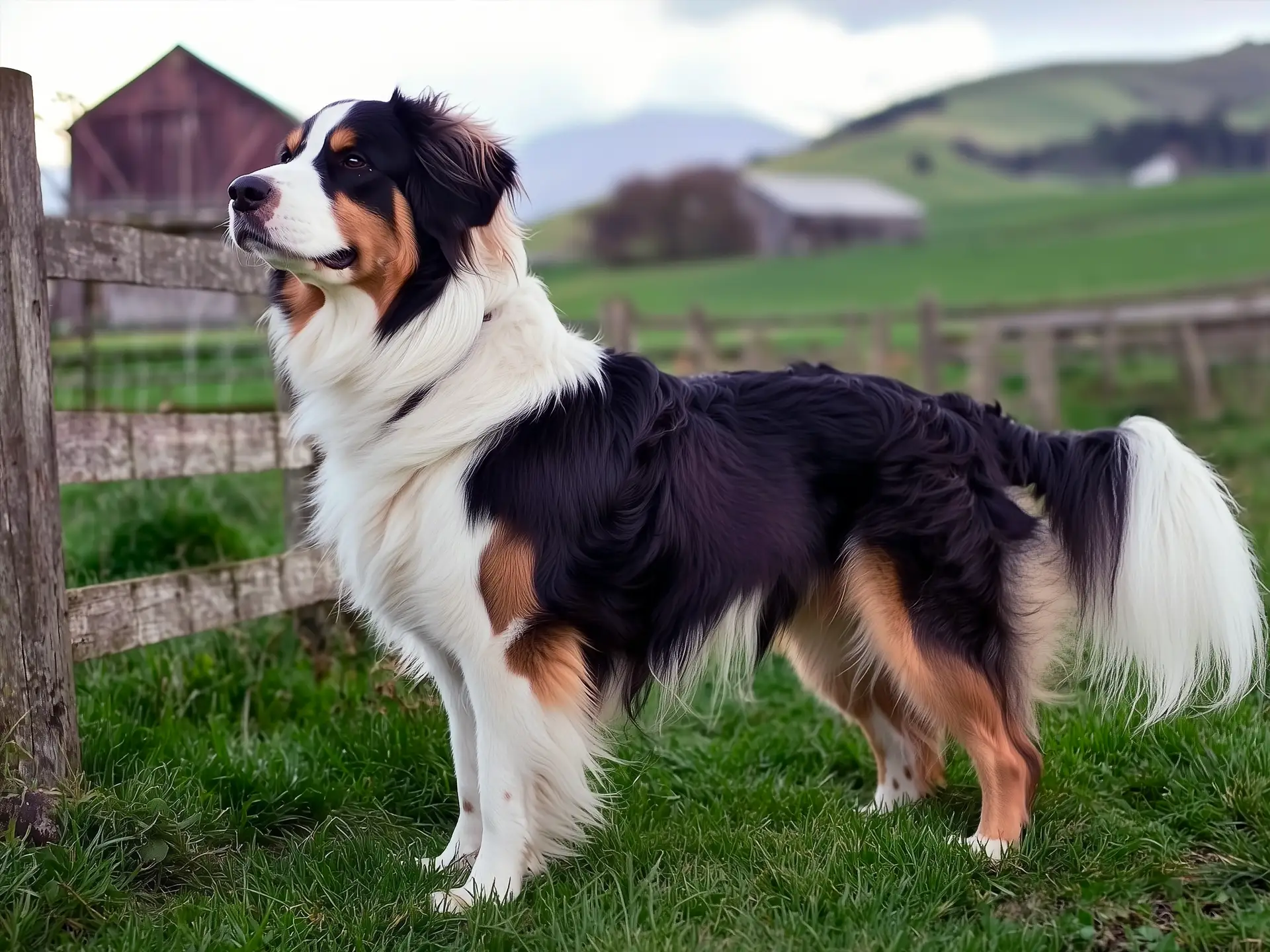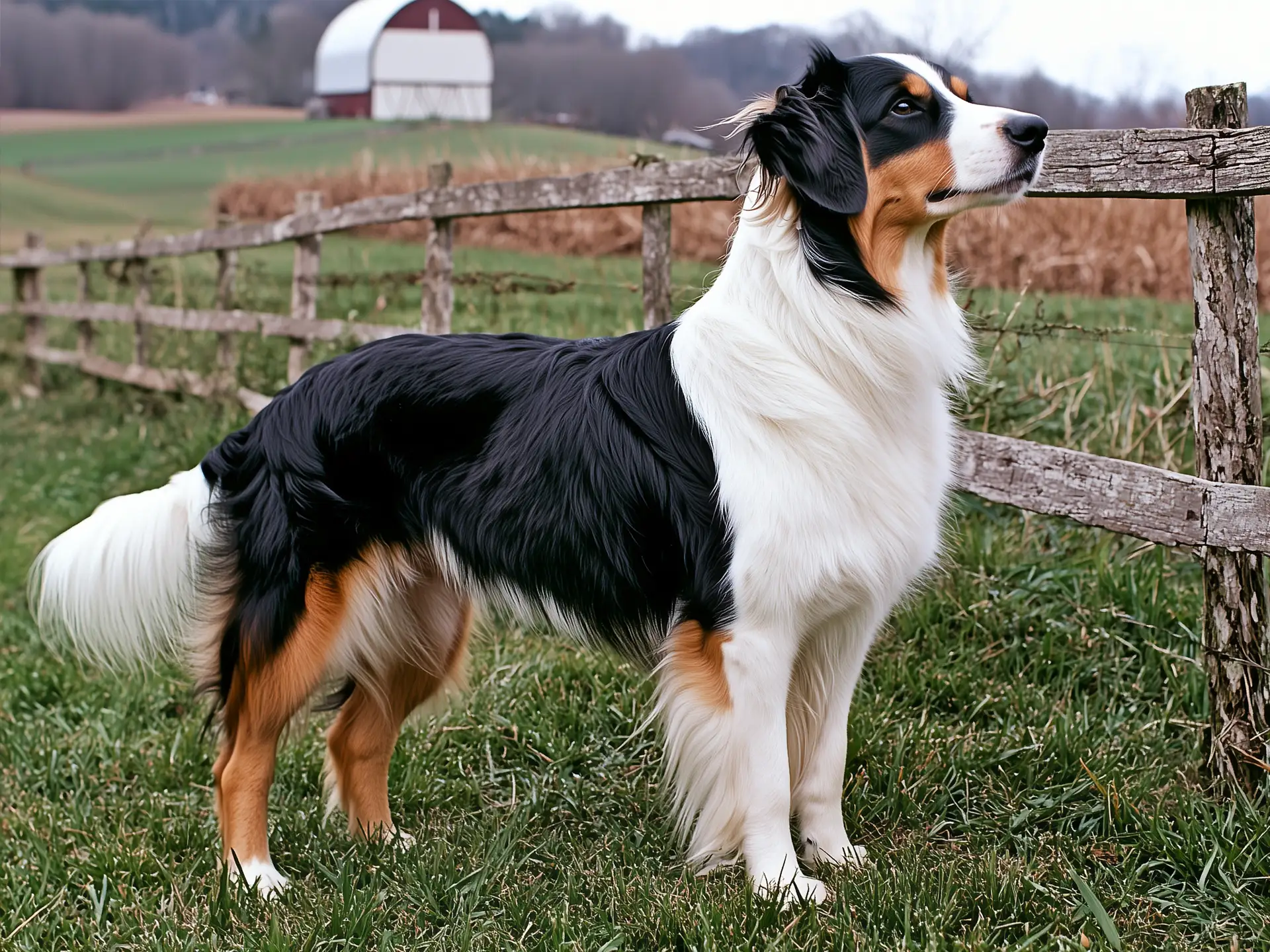English Shepherd Dog Breed Info & Overview
The English Shepherd is the kind of dog that feels like an old friend from the moment you meet. Renowned for their intelligence, loyalty, and versatile working skills, these dogs have long been the unsung heroes of American farms and homes. Whether herding livestock or joining in family play, the English Shepherd brings boundless energy and a devoted heart to everything they do, making them treasured companions for those lucky enough to know them.
Characteristics
Pictures
Breed History
The English Shepherd’s roots trace back to the early settlers who brought their farm dogs from the British Isles to America. These versatile canines adapted to the rugged New World, becoming invaluable helpers on farms across the country. Over time, the English Shepherd evolved into a distinct American breed, prized for its herding prowess and all-around farm skills.
These dogs weren’t just workers; they became family members. Their ability to herd livestock, guard the property, and even hunt small game made them indispensable. The breed maintained its popularity in rural areas, quietly contributing to American agriculture without much fanfare.
Despite their name, English Shepherds are as American as apple pie. They embody the pioneering spirit—adaptable, hardworking, and resilient. Today, they continue to be cherished as loyal companions and capable working dogs, preserving a legacy that spans centuries.
Temperament, Personality
If you’re looking for a dog that’s both a hard worker and a loving family member, the English Shepherd fits the bill. They’re known for their sharp minds and eager-to-please attitudes. This breed thrives on having a job to do, whether it’s herding sheep or fetching a frisbee.
Around children, they are gentle and protective. The English Shepherd often takes on the role of a guardian, keeping a watchful eye over the little ones. Their social nature means they get along well with other pets, especially if raised together from a young age.
Strangers might receive a cautious welcome at first. These dogs are naturally alert and may be reserved with people they don’t know. However, with proper socialization, they can learn to be polite and accepting of new faces, making them well-rounded companions.
Physical Characteristics
The English Shepherd is a medium-sized dog with a sturdy build that’s built for endurance. Their expressive eyes and alert ears give them a keen, intelligent appearance. The breed’s coat comes in a variety of colors, including black and white, tricolor, sable, and tan markings.
Their double coat is weather-resistant, perfect for dogs who spend a lot of time outdoors. The coat is moderate in length, with feathering on the legs and tail adding to their classic shepherd look. Despite their working dog heritage, they carry themselves with a certain grace and agility.
One of the breed’s standout features is their tail, which is typically long and carried low when relaxed. This physical trait complements their balanced proportions and contributes to their ability to make quick, agile movements when herding or playing.
Health Issues
English Shepherds are generally a healthy breed but can be prone to certain genetic conditions. Hip dysplasia is one concern, a common issue in medium to large breeds. Regular vet check-ups and maintaining a healthy weight can mitigate this risk.
Another potential health issue is Collie Eye Anomaly, a genetic condition that can affect eyesight. Responsible breeders often screen for this to ensure healthy puppies. Epilepsy has also been reported in some lines, so it’s important to be aware of your dog’s lineage.
Preventive care goes a long way. Regular exercise, a balanced diet, and routine veterinary visits will help keep your English Shepherd in top shape. Being proactive about their health can contribute to a long, happy life for your furry friend.
Grooming Needs
While the English Shepherd’s coat is designed to be low-maintenance, it does require regular attention. A good brushing once or twice a week will help remove loose hairs and keep their coat looking its best. During shedding seasons in spring and fall, more frequent brushing may be needed.
Bathing is only necessary when they get particularly dirty, as over-bathing can strip the natural oils from their coat. Their ears should be checked regularly for signs of infection, especially if they’ve been romping around outdoors.
Don’t forget about dental hygiene and nail care. Regular teeth brushing and nail trims are essential parts of their grooming routine. Keeping up with these tasks will not only make your dog look good but also contribute to their overall health.
Exercise Requirements
If you’re an active person, the English Shepherd will happily be your exercise buddy. This breed has high energy levels and needs at least 1–2 hours of physical activity each day. Whether it’s a long walk, a hike, or a game of fetch, they’re up for it.
Mental stimulation is just as important. Puzzle toys, obedience training, and even agility courses can keep their sharp minds engaged. Without sufficient exercise and mental challenges, they may become bored and develop unwanted behaviors.
These dogs excel in canine sports like herding trials and flyball. Participating in such activities can strengthen your bond and provide an outlet for their natural instincts. Just remember, a tired English Shepherd is a happy English Shepherd.
Training Tips
Training an English Shepherd can be a rewarding experience thanks to their intelligence and eagerness to please. Positive reinforcement methods work best, using treats and praise to motivate them. Consistency is key; they thrive when they understand what’s expected of them.
Socialization should start early. Expose your puppy to different people, places, and animals to build confidence and good manners. This will help mitigate any reserved behaviors around strangers and ensure they’re well-adjusted adults.
Be prepared for their independent streak. While they’re generally obedient, their strong herding instincts may sometimes lead them to make their own decisions. Patience and ongoing training will help channel their instincts appropriately.
Nutrition, Diet
Feeding an English Shepherd requires attention to their high energy needs. A diet rich in high-quality protein supports muscle development and overall health. Typically, they require about 2 to 3 cups of dry dog food per day, split into two meals.
Portion sizes may vary based on age, activity level, and metabolism. Puppies will have different nutritional needs compared to adults or seniors. Consult with your veterinarian to tailor a diet plan that’s specific to your dog’s requirements.
Avoid overfeeding, as obesity can lead to health issues like hip dysplasia. Keep an eye on treats and human food scraps, ensuring they don’t make up a significant portion of their daily intake. Fresh water should always be available.
Adoption, Breeders
If you’re considering adding an English Shepherd to your family, you have a few options. Adoption is a wonderful route; organizations like the English Shepherd Rescue specialize in rehoming dogs in need. This can be a rewarding way to provide a loving home to a dog.
For those interested in purchasing a puppy, it’s crucial to find a reputable breeder. The English Shepherd Club offers resources to help you locate responsible breeders who prioritize health and temperament.
Avoid puppy mills and pet stores where breeding practices may be questionable. Ask potential breeders about health screenings and meet the puppy’s parents if possible. This ensures you’re bringing home a healthy, well-adjusted companion.
Family Pet?
English Shepherds make excellent family pets for those who can meet their needs. They’re affectionate and form strong bonds with their human families. Their playful nature makes them great companions for children, and they’ll often take on a protective role.
They generally get along well with other pets, especially if socialized early. Their herding instincts might kick in, so supervision with smaller animals is advised. Training can help manage these behaviors to ensure harmony in the household.
Their high energy levels mean they’ll thrive in an active family that can provide plenty of exercise and mental stimulation. If your family enjoys outdoor activities and has the time to devote to a canine companion, the English Shepherd could be a perfect fit.
Right For You?
So, is the English Shepherd the right breed for you? If you’re looking for a loyal, intelligent, and energetic companion, the answer might be yes. They do best in homes where they have a job to do, whether that’s actual herding or being an active family member.
Consider your lifestyle. Do you have the time for daily exercise and mental stimulation? Are you committed to ongoing training and socialization? If you answered yes, you’ll likely find that an English Shepherd enriches your life in countless ways.
However, if you prefer a more laid-back pet or live in a small apartment with limited access to outdoor spaces, this breed might not be the best match. Their need for activity and space is significant, and they thrive when those needs are met.
Conclusion
The English Shepherd is a remarkable breed that offers a blend of intelligence, loyalty, and versatility. They’re more than just working dogs; they’re devoted companions who become integral members of the family. If you have the time and energy to devote to them, you’ll be rewarded with a faithful friend for years to come.
From their rich history to their dynamic personality, there’s so much to love about the English Shepherd. They embody the spirit of hard work and family values, making them a unique addition to the right home. Could this be the breed you’ve been searching for?
FAQs
-
Do English Shepherds bond closely with one person in the family?
English Shepherds are known to form strong bonds with one or two primary caregivers, but they remain loyal and affectionate with all family members. They often choose a “favorite” but enjoy being around and protecting their whole family.
-
How well do English Shepherds handle change, like moving or travel?
English Shepherds can adapt to new environments if they have a stable routine and their family close by. They’re resilient, but it helps to introduce them gradually to new places and ensure familiar items, like toys or blankets, are available.
-
Are English Shepherds prone to any specific behavioral quirks?
English Shepherds may exhibit a strong herding instinct, leading to behaviors like nudging or circling people or animals. They’re also highly intuitive and can sometimes be wary of strangers, making early socialization beneficial.
-
What is the ideal diet for an active English Shepherd?
English Shepherds benefit from a high-protein diet that supports their energy needs. Meals balanced with lean meats, grains, and vegetables, plus omega-3 supplements for coat health, help maintain their stamina and overall health.
-
Can English Shepherds live harmoniously with cats?
Yes, if introduced early, English Shepherds can coexist peacefully with cats. Their herding instincts may prompt playful chasing, so gradual introductions and guidance help foster a respectful relationship with feline companions.
Breed Ratings
The English Shepherd is highly intelligent and quick to learn new commands and tasks.
They have a playful side, especially when interacting with family members and other dogs.
This breed is energetic and requires ample daily exercise to stay content.
Moderate shedding occurs year-round, with heavier shedding during seasonal changes.
They have a moderate prey drive due to their herding background, which can be managed with training.
Regular brushing is needed, but overall grooming is manageable.
Their eagerness to please and intelligence make them highly trainable.
They prefer companionship and may become anxious if left alone for long periods.
Barking is moderate and usually serves as an alert rather than constant noise.
Drooling is minimal with this breed.
Generally gets along well with other dogs, especially when socialized early.
They are relatively healthy but can be prone to certain genetic conditions.















